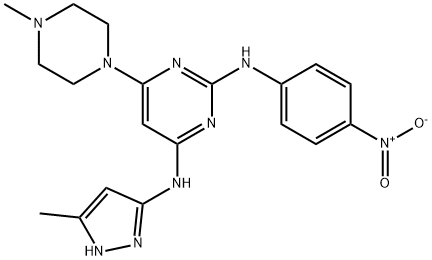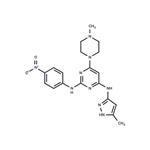AKI603 is an inhibitor of Aurora kinase A (AurA), with an IC50 of 12.3 nM. AKI603 is developed to overcome resistance mediated by BCR-ABL-T315I mutation. AKI603 exhibits strong anti-proliferative activity in leukemic cells[1][2].
AKI603 (0.039-0.6 μM; 48 hours) extensively inhibits proliferation of leukemia cells[1].AKI603 (0.039-0.6 μM; 48 hours) significantly inhibits the phosphorylation of AurA in NB4, K562, and Jurkat cell lines in a dose-dependent manner while the level of total AurA protein is not changed[1].AKI603 inhibits the proliferation and colony formation of imatinib resistant CML cells[1].AKI603 (0.3-0.6 μM; 48 hours) inhibits cell proliferation and colony formation capacities in imatinib-resistant CML cells by inducing cell cycle arrest with polyploidy accumulation[1].Inhibition of AurA by AKI603 induces leukemia cell senescence in both BCR-ABL wild type and T315I mutation cells[1].AKI603 exhibits inhibitory activities on breast cancer cell proliferation, such as SUM149 (IC50=2.04), BT549 (IC50=0.86), MCF-7 (IC50=0.97), MCF-7-Epi (IC50=21.01), Sk-br-3 (IC50=0.73), MDA-MB-231 (IC50=3.49), MDA-MB-453 (MTT, IC50=0.18; Cell counting, IC50=0.19), MDA-MB-468 (MTT, IC50=0.15; Cell counting, IC50=0.17)[2].
AKI603 (12.5-25 mg/kg; i.p.; every 2 days; for 14 days) abrogates the growth of xenografted KBM5-T315I cells in nude mice[1].AKI603 exhibits moderate oral bioavailability (rat 28.7%) and Cmax (rat 202.4 μg/L) following oral administration (rat 25 mg/kg)[3].AKI603 exhibits terminal elimination half-life (rat 8.9 h) following intravenous administration (rat 2.5 mg/kg)[3].
[1]. Le-Xun Wang, et al. Aurora A Kinase Inhibitor AKI603 Induces Cellular Senescence in Chronic Myeloid Leukemia Cells Harboring T315I Mutation. Sci Rep. 2016 Nov 8;6:35533. [2]. Fei-Meng Zheng, et al. A novel small molecule aurora kinase inhibitor attenuates breast tumor-initiating cells and overcomes drug resistance. Mol Cancer Ther. 2014 Aug;13(8):1991-2003. [3]. Zhenzhen Zhao, et al. Determination of a novel Aurora-A (AurA) kinase AKI603 by UPLC-MS/MS and its application to a bioavailability study in rat. J Pharm Biomed Anal. 2016 Jun 5;125:303-9.

